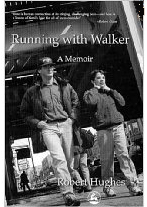Book review: Robert Hughes’ “Running with Walker: A Memoir”
by Patricia
During one of my many visits to Easter Seals Chicago Metropolitan, I had the good fortune of meeting Robert Hughes. Hughes is the author of a memoir called Running with Walker — the story of his family’s relationship with his son Walker, who has autism. I got a few details about the book and decided it would be a worthy purchase. Lucky me — Mr. Hughes had the book with him. He gave me a signed copy.
I had plenty of work to do the next weekend, but I could not tear myself away from this book. Hughes provides an incredibly heartfelt glimpse into his family. Walker is a young man now, and the emotional turmoil, educational decisions, and family turbulence that went along with his upbringing is all here in his father’s memoir. When I was done reading Running with Walker, I felt compelled to send an email to Mr. Hughes. I told him that sharing at such an in-depth level and allowing himself to be viewed at both his best and worst was very brave. His love for Walker shines in every page of this book. The challenges of raising Walker are equally as visible on the pages.
I have dedicated my 20-year-career to ensuring that individuals with Autism Spectrum Disorders (ASD) and other disabilities are fully-included in society. My personal mission is to offer the support that makes it possible for people with ASD and other disabilities to lead meaningful, happy and productive lives.
Still, with all that experience, I truly have no idea what it means to raise, love, cherish and be challenged by a son or daughter with autism. As a professional I feel an obligation to raise my empathy skills regarding family dynamics and autism. This book absolutely contributed to my empathic skills. Running with Walker is well worth the read!








January 5th, 2009 at 3:38 pm
I’ll second Patricia Wright’s endorsement of this book. If you’re a parent of a child with autism–or really any disability–there’s a lot here for fathers and mothers alike. Hughes is frank in a courageous way, in that his account is not always flattering to himself. You’ll take comfort in learning that you aren’t the only parent that doesn’t respond gracefully to every challenge, every time. If you’re wondering whether two parents can stay together in the face of those challenges, it’s also heartening–and often funny–to read the accounts of how to fashion roles according strengths and weaknesses. (Just think good-cop/bad-cop.)
In general, parents of kids with disabilities can feel awfully alone and alienated; this book sort of captures that feeling, and–maybe ironically–in the process makes you feel like you’re not alone at all, and that you have a lot of good company.